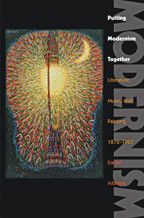
Reviews
There is certainly no easy way to replicate the environment of the interwar period, but Anthony Domestico is to be commended for implanting such a desire in his readers. Perhaps some of these readers will be stirred to action. I for one would love to hold a contemporary equivalent to the Criterion in my hands, and I believe that Poetry and Theology in the Modernist Period succeeds in that it will make others want this as well.
This brief but substantial study details how contemporary theological debates were part and parcel of the wider intellectual climate of modernism, as well as a specific influence on poetry by T. S. Eliot, David Jones, and W. H. Auden. It is a welcome addition to recent work on the inescapable and continuing influence of Christianity at every stage of the modernist project.
I also recently read Anthony Domestico’s wonderful and revelatory critical book Poetry and Theology in the Modernist Period, which has much to say about whether poetry and theology can nourish each other (for many of the modern poets, Domestico argues quite convincingly, they certainly did).
Domestico knows his theology very well... He can illuminate the shape of a theologian's argument, as well as what was at stake in the historical context. By training his sights on those literary authors for whom theology mattered—and for whom theology meant dogma and revelation—Domestico does invaluable work.
Poetry and Theology in the Modernist Period is brilliantly set up to offer an introductory yet complex view of the intellectual landscape of the inter-war period... it presents an energetic invitation to the next generation of auditors to join [Domestico] in taking seriously the relationship between theology and poetic style.
Poetry and Theology in the Modernist Period is a valuable addition to a growing body of criticism that challenges the narrative that modernism was resolutely secular. As this study shows, not only did some writers take contemporary theology seriously, but theologians had a marked impact on the works of T. S. Eliot, W. H. Auden, and David Jones... One of the great strengths of this illuminating and important study... is that its insights and approach will encourage others to continue the conversation.
A significant addition to our understanding of the poetry and poetics of Eliot, Jones, and Auden, all three of whom look at the central importance of Christian theology as a way of understanding the unfolding history of humankind through the fractured and fracturing lens of modernism. Highly informative and enlightening.
Why did modernist poets seek out theology as the fuel for their poetics? That they did so, and why and how, is the news Domestico tells. Through little-known intellectual histories and a well-known poetic corpus, he allows readers of this poetry to 'reclaim ideas' as the poets themselves did. Domestico's exceptionally graceful writing makes vivid both their thought and his own.
Call it theology, or Christian doctrine, or religious thought: Anthony Domestico shows that it drew and held the attention of three distinctive poets—poets at once modern and neo-traditional—and that it shaped their poetry decisively. He does so with sufficient subtlety and delicacy that the question of whether those poets were representatives of their age or outriders from it lurks provocatively beneath his text the way the substratum of the Christian tradition lies beneath theirs.
Book Details
Acknowledgments
1. A Conversation between Philosophers
and Artists
2. The "Living Theology" of the Criterion
3. T. S. Eliot, Karl Barth, and Christian Revelation
4. Sacramental Theology and David Jones’s
Acknowledgments
1. A Conversation between Philosophers
and Artists
2. The "Living Theology" of the Criterion
3. T. S. Eliot, Karl Barth, and Christian Revelation
4. Sacramental Theology and David Jones’s Poetics of Torsion
5. Auden’s Meanwhile
Conclusion
Notes
Suggested Further Reading
Index





